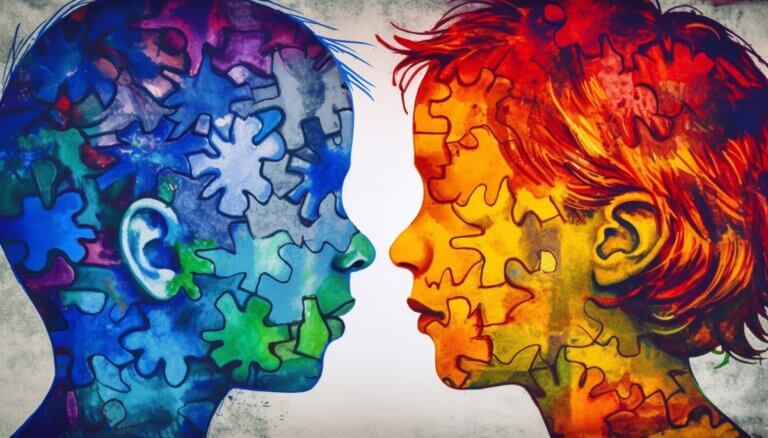Table of Contents
Emotional Intelligence versus Intelligence Quotient

The Significance of Emotional Intelligence in Everyday Life
In our daily interactions with the world, emotional intelligence (EI) plays a vital role – it is the key to understanding one another and having clear self-awareness. Compared to cognitive intelligence (IQ), EI introduces a different, equally valuable dimension of understanding into our lives. It allows for profound insights into the dynamics of human behavior and one’s own emotional landscape.
Emotional Intelligence vs. IQ
The contrasts and synergies between cognitive and emotional intelligence are fundamental. While IQ is often associated with analytical skills and logical thinking, EI is characterized by the ability to understand, interpret, and respond appropriately to emotions. The difference between emotional intelligence and IQ becomes particularly evident in conflict resolution and the maintenance of interpersonal relationships.
A telling example can be found in the workplace: A leader with a high IQ can quickly analyze data and make strategic decisions. However, when faced with a motivated team going through an emotional crisis, EI becomes a decisive factor. It helps them show empathy, gauge the team’s mood, and support the staff in a way that keeps their motivation and productivity intact.
Differences Between Emotional Intelligence and IQ in Everyday Life
Emotional intelligence is not only relevant in the workplace but also in personal life. Take family life, for example: A parent with high emotional intelligence will be able to detect changes in their children’s behavior early on and react empathetically. Emotional intelligence enables parents to assist their children in developing and strengthening their own emotional skills.
- In relationship disputes, EI helps control one’s reactions and understand the perspective of the other person.
- In friendships, emotional intelligence leads to deeper understanding and strengthens mutual trust.
- Even in self-reflection, EI is a useful tool for better understanding one’s motivations and reactions.
IQ and Emotional Intelligence in Communication
Ultimately, emotional intelligence permeates all aspects of human communication. It contributes to our ability to “listen in” to emotional undertones, thus understanding not only what is said but also what is meant.
Regarding the intelligence comparison, it is evident that both EI and IQ are vital building blocks that can complement each other. Therefore, the best approach in life and at work is to cultivate both forms of intelligence and bring them into harmony. By doing so, we become well-rounded individuals capable of using both intellect and emotions to unleash our full potential and maintain positive relationships with our surroundings.
Impact of Emotional Intelligence on Career Success
In professional life, we often encounter the debate “Emotional Intelligence vs. IQ”. While traditionally the comparison of intelligence heavily focused on IQ, in recent years there has been increasing awareness of the significance of Emotional Intelligence (EI). Once we understand the differences between Cognitive and Emotional Intelligence, we recognize that the latter is a key aspect of success in our careers.
The Impact of Emotional Intelligence in Leadership Daily Life
Imagine a leader who can read the mood of the team and act accordingly. They utilize their EI skills to show empathy and resolve conflicts. At the same time, their emotional intelligence helps manage stress and act as a motivator. A high level of EI also means being able to reflect on and control one’s own behavior and emotions, which is crucial in leadership positions. The connection between high EQ and successful team leadership is proven by numerous studies.
Practical example: A study at a global consulting firm showed that consultants with pronounced emotional intelligence had better working relationships and were more effective in the team. Thus, these consultants were able to complete their projects more successfully and efficiently.
Customer Retention through Emotional Intelligence
Another important facet of Emotional Intelligence is the ability to deal with customers. Those who can empathize with the needs and emotions of the customers build a connection faster, which is reflected in improved customer satisfaction. Empathy enables professionals to offer tailored solutions and build trust, which leads to higher customer loyalty in the long term.
A true example: Salespeople who take the time to understand and address the needs of customers often achieve higher sales numbers and better customer ratings than those who do not.
Networking through Emotional Intelligence
In networking, EI is an invaluable ability to strengthen and maintain interpersonal relationships. A high EI value allows individuals to connect more easily with different characters and to build effective, mutually beneficial relationships. The ability to empathize with others and create authentic connections is essential for professional success.
A case study: Networking events, where an entrepreneur has gained the trust of potential business partners through his high emotional intelligence, often lead to successful collaborations and long-term business relationships.
The examples clearly show that a high IQ is not the only predictor of professional success. Emotional intelligence plays a central role in today’s work environment. It significantly influences how we interact with colleagues, customers, and business partners. People with pronounced emotional intelligence are often those who stand out in their careers and achieve extraordinary success.
Measurability and Development Potential

Comparison of Measurement Methods for EQ and IQ
In the context of personality development, both emotional intelligence (EQ) and the classic Intelligence Quotient (IQ) play a fundamental role. When we talk about Emotional Intelligence vs. IQ, we enter a field of lively discussions, as this comparison involves different skills and measurement approaches.
Measuring Emotional Intelligence Quotient
Emotional intelligence includes the ability to recognize, understand, and influence one’s own emotions and those of others. Measuring EQ as compared to IQ is challenging because emotional processes are complex and often context-dependent. To understand the difference between Emotional Intelligence and IQ, one must first recognize that EQ is measured not through standardized tests but through self-assessment and peer-assessment questionnaires and by observation in social interactions. Various models and theories exist, such as that of Daniel Goleman, which identifies areas like self-awareness, self-regulation, motivation, empathy, and social skills as core areas of emotional intelligence.
The Structure of Classic IQ Tests
In contrast, IQ tests that determine a person’s cognitive capacity are based on standardized and timed tasks. These focus on evaluating abilities such as logic, spatial visualization, language comprehension, and memory. The question of Cognitive vs. Emotional Intelligence often arises, where it is noted that high performance in IQ tests does not necessarily correlate with successful social interactions or coping with everyday demands. It is evident that while IQ can predict academic and professional success, emotional intelligence plays an equally crucial role in social success and life satisfaction.
The direct comparison between IQ and Emotional Intelligence shows that both forms of intelligence capture important yet distinctly different aspects of human capabilities. While IQ primarily assesses cognitive aspects, EQ provides insights into social-emotional understanding. A balanced interplay of both intelligence components seems essential for holistic personality development.
Real-life examples: An outstanding natural scientist (high IQ) might struggle with motivating his team or managing empathetic customer relations (low EQ). Conversely, a person with moderate mathematical abilities but strong emotional intelligence could be an excellent leader. Thus, personal and professional success depends on the combination and balance of both skills.
Improvement and Training of Emotional Intelligence
In a dialogue with our own emotions and those of others, we come to recognize the immense value that emotional intelligence holds in our everyday lives. It’s a fascinating interplay between Emotional Intelligence vs. IQ and emotional and cognitive intelligences, which has a profound impact on our personal and professional success.
Understanding the Basics of Emotional Intelligence
Emotional intelligence encompasses a variety of skills. It enables us to recognize, understand, and regulate our own emotions, as well as to read and adequately respond to the emotions of others. Unlike cognitive intelligence, which is measured by IQ, emotional intelligence relates to dealing with emotions and social interactions.
- Awareness of one’s own emotions leads to better self-control and self-motivation.
- Recognizing and understanding the emotions of others fosters empathy and enhances our ability to maintain relationships.
- The ability to manage emotions helps us navigate conflicts and effectively handle stress.
Developing Emotional Intelligence
Despite the differences and often perceived competitive relationship between IQ and emotional intelligence, both types of intelligence can be developed. While IQ generally remains fairly stable, emotional intelligence offers room for growth and improvement, regardless of age.
- Mindfulness practices and meditation can help sharpen awareness of one’s own emotions.
- Communication training and role-playing can enhance empathy and interpersonal skills.
- Setting clear, achievable goals and pursuing them strengthens self-motivation and the ability to self-regulate.
The Benefits for Personal Growth
Improving emotional intelligence has long-term impacts. It can open the door to better relationships, balanced well-being, and professional success. Individuals with high emotional intelligence are better equipped to cope with challenges and foster constructive relationships.
- In professional life, higher emotional intelligence can lead to better teamwork and leadership.
- In personal relationships, it can contribute to deeper understanding and stronger connections.
- For managing stress, it offers effective strategies that enhance well-being.
A broad spectrum of scientifically based methods and techniques contributes to the trainability and development of these skills. Whether through guided reflection, practical exercises, or professional coaching, emotional intelligence is a learnable and refinable skill that can enrich our lives in various ways.
Summary
Emotional Intelligence (EI) is an indispensable skill that enables us to understand our own emotions and those of the people around us and respond to them. It serves as a complementary counterpart to cognitive intelligence (IQ) and plays a central role in the dynamics of human behavior and mutual understanding. While IQ measures our analytical and logical abilities, emotional intelligence helps us master social interactions and develop a deep awareness of our emotional world. The difference between emotional intelligence and IQ becomes especially apparent in dealing with conflicts and in relationships. At this point, Cognitive vs. emotional intelligence overlap and demonstrate how essential the interplay of both is for personal and professional success.
The Relevance of Emotional Intelligence in Various Areas of Life
In professional life, EI is essential, especially in leadership positions, where it promotes empathy and conflict resolution skills. In private life, such as in parenting, partnerships, and friendships, EI contributes to deeper understanding and stronger relationships. Self-reflection and the ability to manage one’s own emotions are also components of emotional intelligence. An intelligence comparison shows that both EI and IQ are important components, but they influence different areas of human experience.
- In the family, parents with high EI can be more sensitive to the needs of their children.
- In relationships, EI helps reduce misunderstandings and resolve conflicts peacefully.
- At the workplace, high EI promotes teamwork and can improve leadership qualities.
Development and Enhancement of Emotional Intelligence
Unlike IQ, which tends to be relatively stable over the years, emotional intelligence can be continually improved with targeted practices, having a positive impact on our lives.
- Mindfulness and meditation sharpen awareness of one’s own feelings.
- Communication training enhances empathy and the ability to relate to others’ emotions.
- Goal setting and pursuit strengthen self-motivation and self-regulation.
This is significant not only for leadership roles but also for everyday interactions. Individuals with highly developed EI are often better able to cope with challenges and maintain long-term successful relationships.
Emotional intelligence thus significantly influences how we interact with colleagues, customers, and business partners and is a crucial factor for life satisfaction and social success. Anyone wanting to improve their emotional intelligence can do so through numerous scientifically based methods, thus growing into a well-rounded personality with rich emotional understanding. The dialogue Emotional Intelligence vs. IQ remains a field of tension, yet cultivating both forms of intelligence is the path to a fulfilled life.
FAQ – Emotional Intelligence vs. IQ
In which areas of life is the difference between emotional intelligence (EI) and traditional intelligence quotient (IQ) most apparent?
Emotional intelligence particularly comes to the fore in interpersonal areas, where empathy, self-regulation, and social skills are crucial for building and maintaining relationships. While IQ plays a major role in academic and professional settings like problem-solving and analytical thinking, EI is key to successful teamwork, conflict resolution, and leadership skills. In emotionally charged situations and when dealing with stress, EI demonstrates its strength by enabling people to understand their own feelings and respond appropriately, as well as to recognize and prudently manage the emotions of others.
How does emotional intelligence (EI) differ from a traditional Intelligence Quotient (IQ) in predicting professional success?
Emotional Intelligence, often abbreviated as EI, entails the awareness and capability to comprehend and manage one’s own emotions as well as those of others, which is crucial for interpersonal relationships in the workplace. In contrast, the Intelligence Quotient, known as IQ, primarily measures cognitive abilities such as logic, language understanding, and spatial perception, which involve the technical and theoretical problem-solving prowess of an individual. EI is often a better predictor of professional success because it directly correlates with leadership qualities and teamwork, while IQ more heavily influences academic and specialized achievements.
How does the contribution of emotional intelligence differ compared to the traditional intelligence quotient in terms of professional success?
Emotional intelligence is crucial for interpersonal relationships and leadership skills as it enables people to understand and respond to their own and others’ emotions, which leads to better teamwork and conflict resolution in the workplace. In contrast, the traditional Intelligence Quotient measures cognitive abilities such as logical thinking and problem-solving, which are important for technical and analytical tasks but do not directly address social skills or self-awareness. In many cases, a combination of both forms of intelligence is ideal; while IQ can provide a foundation, emotional intelligence allows for the effective application of cognitive skills in the social context of professional life.




